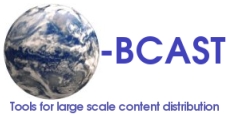Two versions of FLUTE/ALC and FCAST/ALC exist:
 a public version, available under a GNU/GPL licence
a public version, available under a GNU/GPL licence
 a commercial version, available under a Commercial licence.
a commercial version, available under a Commercial licence.
These two versions differ significantly, some advanced features being available only in the commercial version. People interested in using FLUTE/ALC or FCAST/ALC in environments where a GNU/GPL licence is not acceptable (see below) are invited to contact me at vincent.roca@inrialpes.fr. The commercial version will enable you to bypass the GNU/GPL limitations.
What can be done with a GNU/GPL software? When is the commercial licence required?
In short: the GNU/GPL licence is contagious (even if this is not a disease ;-) and will contaminate any piece of code that you own that is combined with it (see below to understand what "combined" means). In particular, the source code of the whole software must be provided to any client that asks for it.
Please visit the excellent site to know more about the GNU/GPL licence:
http://www.gnu.org/licenses/gpl-faq.html
I have collected some excerpts below:
- I’d like to incorporate GPL-covered software in my proprietary system. Can I do this?
link
You cannot incorporate GPL-covered software in a proprietary system.
The goal of the GPL is to grant everyone the freedom to copy,
redistribute, understand, and modify a program. If you could
incorporate GPL-covered software into a non-free system, it would
have the effect of making the GPL-covered software non-free too.
A system incorporating a GPL-covered program is an extended version
of that program. The GPL says that any extended version of the
program must be released under the GPL if it is released at all.
This is for two reasons: to make sure that users who get the
software get the freedom they should have, and to encourage people
to give back improvements that they make.
However, in many cases you can distribute the GPL-covered software
alongside your proprietary system. To do this validly, you must make
sure that the free and non-free programs communicate at arms length,
that they are not combined in a way that would make them effectively
a single program.
The difference between this and "incorporating" the GPL-covered
software is partly a matter of substance and partly form. The
substantive part is this: if the two programs are combined so that
they become effectively two parts of one program, then you can’t
treat them as two separate programs. So the GPL has to cover the
whole thing.
If the two programs remain well separated, like the compiler and the
kernel, or like an editor and a shell, then you can treat them as
two separate programs—but you have to do it properly. The issue is
simply one of form: how you describe what you are doing. Why do we
care about this? Because we want to make sure the users clearly
understand the free status of the GPL-covered software in the
collection.
If people were to distribute GPL-covered software calling it "part
of" a system that users know is partly proprietary, users might be
uncertain of their rights regarding the GPL-covered software. But if
they know that what they have received is a free program plus
another program, side by side, their rights will be clear.
- If I use a piece of software that has been obtained under the GNU GPL, am I allowed to modify the original code into a new program, then distribute and sell that new program commercially?
link
You are allowed to sell copies of the modified program commercially,
but only under the terms of the GNU GPL. Thus, for instance, you
must make the source code available to the users of the program as
described in the GPL, and they must be allowed to redistribute and
modify it as described in the GPL.
These requirements are the condition for including the GPL-covered
code you received in a program of your own.
- My friend got a GPL-covered binary with an offer to supply source, and
made a copy for me. Can I use the offer myself to obtain the source?
link
Yes, you can. The offer must be open to everyone who has a copy of
the binary that it accompanies. This is why the GPL says your friend
must give you a copy of the offer along with a copy of the
binary---so you can take advantage of it.
- I want to distribute an extended version of a GPL-covered program in binary form. Is it enough to distribute the source for the original version?
link
No, you must supply the source code that corresponds to the binary.
Corresponding source means the source from which users can rebuild
the same binary.
Part of the idea of free software is that users should have access
to the source code for *the programs they use*. Those using your
version should have access to the source code for your version.
A major goal of the GPL is to build up the Free World by making sure
that improvement to a free program are themselves free. If you
release an improved version of a GPL-covered program, you must
release the improved source code under the GPL.

 Site Map
Site Map
 Private Area
Private Area
 http://www.inria.fr
http://www.inria.fr
 a public version, available under a GNU/GPL licence
a public version, available under a GNU/GPL licence